Landscape Gardening in Tufnell Park
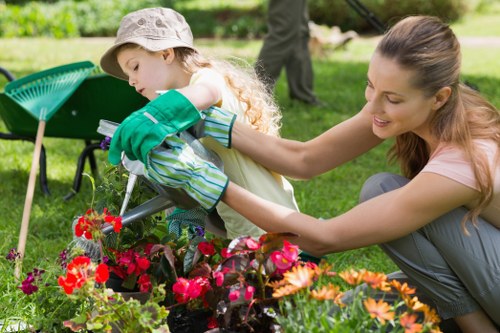
Introduction to Landscape Gardening
Landscape gardening in Tufnell Park combines the charm of urban living with the tranquility of nature. Nestled in the heart of London, Tufnell Park offers a unique environment where garden enthusiasts can create stunning outdoor spaces despite the urban setting. Whether you're a seasoned gardener or a beginner, understanding the nuances of landscape gardening in this vibrant area can help you cultivate a beautiful and sustainable garden.
Embracing the local climate and soil conditions is essential for successful landscape gardening in Tufnell Park. The region experiences a temperate climate with moderate rainfall, making it suitable for a variety of plant species. By selecting the right plants and employing effective gardening techniques, you can ensure your garden thrives year-round.
Moreover, landscape gardening in Tufnell Park is not just about aesthetics; it's also about creating a space that promotes biodiversity and supports local wildlife. Incorporating native plants and sustainable practices can enhance the ecological value of your garden, making it a haven for birds, bees, and other beneficial creatures.
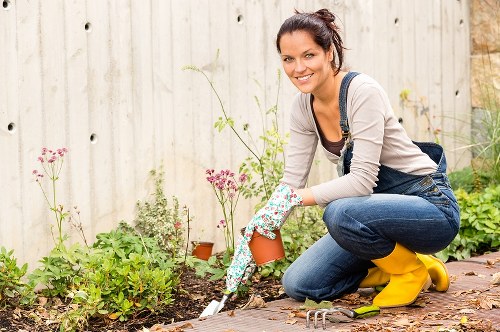
Planning Your Garden Layout
Proper planning is the cornerstone of any successful landscape garden. Start by assessing the available space in your Tufnell Park garden, taking note of sunlight exposure, soil quality, and existing structures. Creating a detailed garden plan helps you visualize the end result and make informed decisions about plant placement and garden features.
Consider incorporating various zones within your garden, such as a seating area, planting beds, and pathways. Each zone can serve a different purpose, from relaxing and entertaining to growing vegetables and herbs. Utilizing vertical gardening techniques can also maximize space, especially in smaller gardens typical of urban settings like Tufnell Park.
Additionally, think about the flow and accessibility of your garden. Designing easy-to-navigate pathways and ensuring that all areas are reachable will enhance the functionality and enjoyment of your outdoor space. Incorporating elements like pergolas, trellises, and garden arches can add structure and visual interest to your layout.
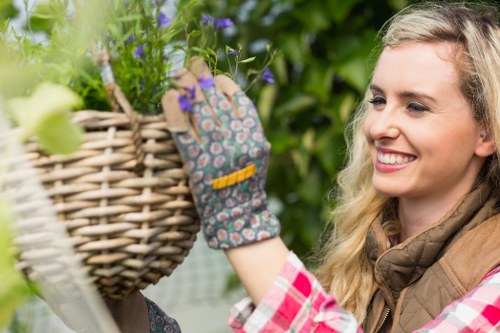
Choosing the Right Plants
Native and Adapted Species
Selecting the appropriate plants is crucial for a thriving garden. Native and adapted species are well-suited to the local climate and soil conditions, making them easier to maintain and more resilient against pests and diseases. Plants like lavender, holly, and heather are excellent choices for Tufnell Park gardens.
Incorporating a mix of perennials, annuals, shrubs, and trees can create a diverse and dynamic garden. Perennials provide long-term structure and repeat blooms, while annuals offer seasonal color and variety. Shrubs and trees not only add height and texture but also contribute to the overall health of your garden ecosystem.
Consider the flowering seasons of your chosen plants to ensure continuous blooms throughout the year. This not only enhances the visual appeal of your garden but also supports pollinators like bees and butterflies across different seasons.
Color Schemes and Themes
Establishing a cohesive color scheme can unify your garden design and create a harmonious environment. Whether you prefer a monochromatic palette, complementary colors, or vibrant contrasts, selecting colors that resonate with your personal taste and the surrounding environment is key.
Theme-based gardening, such as cottage gardens, modern minimalist designs, or wildlife-friendly gardens, can provide a clear direction for your landscaping efforts. Each theme has its own set of plant selections, structures, and color schemes that contribute to the overall aesthetic and functionality of the garden.
- **Cottage Gardens:** Known for their informal, romantic charm with a mix of flowering plants and herbs.
- **Modern Minimalist:** Characterized by clean lines, structured planting beds, and a limited color palette.
- **Wildlife-Friendly:** Focused on creating habitats for local fauna with native plants and water features.
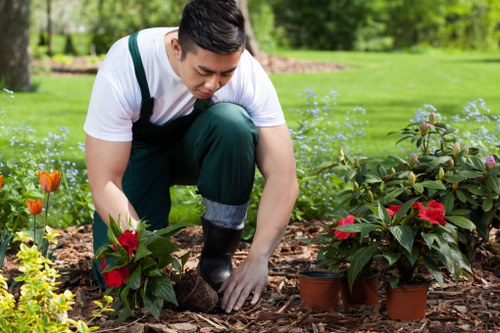
Implementing Sustainable Practices
Sustainability is a growing concern in landscape gardening, and Tufnell Park gardeners are increasingly adopting eco-friendly practices. Utilizing rainwater harvesting systems can reduce water consumption and provide a reliable water source during dry periods. Installing drip irrigation systems ensures efficient water delivery directly to plant roots, minimizing waste.
Composting organic waste not only reduces landfill contributions but also provides nutrient-rich material for your garden. Compost can improve soil structure, enhance fertility, and promote healthy plant growth. Additionally, selecting drought-tolerant plants can further decrease the need for frequent watering.
Integrating permaculture principles into your garden design can create a self-sustaining ecosystem. This involves arranging plants in mutually beneficial arrangements, conserving resources, and minimizing external inputs. Practices like mulching, companion planting, and natural pest control methods contribute to a resilient and low-maintenance garden.
Energy-Efficient Landscaping
Energy-efficient landscaping not only benefits the environment but also reduces utility costs. Strategic placement of trees and shrubs can provide natural shading, reducing the need for air conditioning in the summer. Conversely, deciduous trees can offer sunlight in the winter after shedding their leaves, helping to warm your garden spaces.
Using solar-powered garden lights and energy-efficient tools can further enhance the sustainability of your landscape gardening practices. Incorporating recycled materials for garden structures and pathways also contributes to reducing your garden's carbon footprint.
- **Rainwater Harvesting:** Collect and store rainwater for irrigation.
- **Drip Irrigation:** Install systems that provide targeted watering to plant roots.
- **Composting:** Recycle organic waste to enrich garden soil.
- **Drought-Tolerant Plants:** Choose species that require minimal watering.
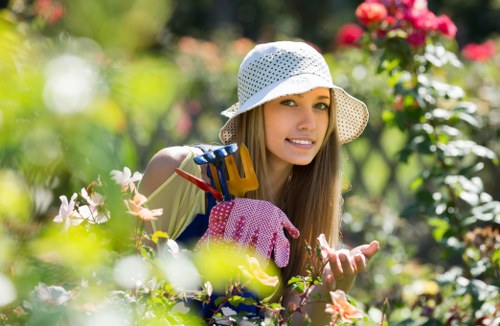
Maintenance Tips for a Flourishing Garden
Regular maintenance is essential to keep your landscape garden in Tufnell Park looking its best. This includes tasks such as pruning, weeding, and fertilizing. Pruning helps maintain the shape and health of your plants, promoting better growth and preventing disease.
Weeding should be done consistently to prevent invasive species from taking over your garden beds. Utilizing mulch can suppress weed growth, retain soil moisture, and regulate soil temperature, making it easier to manage your garden.
Fertilizing provides the necessary nutrients for your plants to thrive. Organic fertilizers are a great choice as they enrich the soil without introducing harmful chemicals. Regularly checking for signs of pests and diseases allows you to address issues promptly, ensuring your garden remains healthy and vibrant.
Seasonal Care
Adapting your maintenance routine to the changing seasons ensures that your garden remains resilient and attractive throughout the year. In spring, focus on planting new specimens and preparing beds for the growing season. Summer requires diligent watering and pest control, while autumn is the time for harvesting and preparing plants for winter.
Winter care involves protecting sensitive plants from frost and snow, as well as performing any necessary repairs to garden structures. By being proactive and responsive to seasonal changes, you can maintain a flourishing landscape garden in Tufnell Park year-round.
- **Spring:** Planting, soil preparation, and pruning.
- **Summer:** Watering, pest control, and weeding.
- **Autumn:** Harvesting, composting, and preparing for winter.
- **Winter:** Protecting plants, maintaining tools, and planning for the next season.
Enhancing Your Garden with Features
Incorporating features like water elements, garden art, and seating areas can elevate the appeal of your landscape garden in Tufnell Park. Water features such as fountains, ponds, or small streams add a calming ambiance and attract wildlife. These elements can serve as focal points, enhancing the overall aesthetic of your garden.
Garden art, including sculptures, decorative pots, and trellises, adds personality and character to your outdoor space. Choosing pieces that complement your garden's theme can create a cohesive and visually appealing environment.
Seating areas, whether it's a cozy bench under a tree or a set of patio chairs near a dining table, provide spaces for relaxation and socializing. These areas encourage you to spend more time enjoying your garden, fostering a deeper connection with nature.
Lighting for Ambiance and Safety
Garden lighting plays a vital role in both the functionality and beauty of your landscape gardening efforts. Well-placed lights can highlight key features, create inviting pathways, and extend the usability of your garden into the evening hours.
Solar-powered lights are an eco-friendly option that reduces energy consumption while providing adequate illumination. Additionally, strategically placed lighting can enhance safety by illuminating dark corners and preventing accidents during nighttime garden activities.
- **Water Features:** Incorporate fountains, ponds, or small streams.
- **Garden Art:** Add sculptures, decorative pots, and trellises.
- **Seating Areas:** Create spaces for relaxation and socializing.
- **Lighting:** Install solar-powered lights and pathway illumination.
Choosing Professional Help
While DIY landscape gardening is rewarding, enlisting the help of professionals can significantly enhance the quality and efficiency of your garden projects. Local landscape gardeners in Tufnell Park possess the expertise and knowledge of the area's specific conditions, ensuring that your garden is both beautiful and sustainable.
Professional landscapers can assist with design planning, plant selection, and installation, saving you time and effort. They are also equipped to handle more complex tasks such as constructing water features, installing irrigation systems, and implementing sustainable practices.
Moreover, hiring a professional ensures that maintenance is carried out regularly and effectively, keeping your garden in pristine condition. They can provide tailored advice and solutions to address any challenges, helping your landscape garden in Tufnell Park thrive.
Benefits of Hiring Local Experts
Local landscape gardening professionals understand the unique challenges and opportunities presented by the Tufnell Park environment. Their familiarity with local plant species, soil types, and climate conditions allows them to create gardens that are well-adapted and resilient.
Additionally, local experts are more accessible for ongoing maintenance and support. Building a relationship with a nearby landscaper ensures that any issues can be addressed promptly, maintaining the health and beauty of your garden over time.
- **Expertise:** Access to specialized knowledge and skills.
- **Efficiency:** Faster and more effective project completion.
- **Quality:** High standards of workmanship and materials.
- **Support:** Ongoing maintenance and troubleshooting.
Conclusion
Landscape gardening in Tufnell Park offers the perfect opportunity to blend urban living with the beauty of nature. By carefully planning your garden layout, selecting the right plants, and implementing sustainable practices, you can create a stunning outdoor space that reflects your personal style and enhances the local ecosystem.
Whether you choose to embark on the gardening journey yourself or seek the expertise of local professionals, the results can be both rewarding and long-lasting. Embrace the unique characteristics of Tufnell Park and transform your garden into a thriving sanctuary that brings joy and tranquility to your daily life.
Ready to transform your outdoor space? Contact us today to start your landscape gardening journey in Tufnell Park and create the garden of your dreams.

